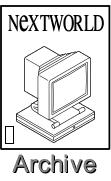 |  |  |  |  |  |  |  |
| | | | |

|

|
|
| |
March 1992 |
|
 |
|

|
 |
Third-party developers describe "spotty" relations
by Clair Whitmer
The wave of enthusiasm about development under NeXTstep has continued to ride high since NeXTWORLD Expo in January. #But some third-party NeXT developers contend it isn't easy to get NeXT's attention and support.
The issues that fire the tempers of many developers include complaints that NeXT has created a skewed playing field; frustration over spotty communication between NeXT and the developer community; and disagreement with NeXT marketing decisions and positioning.
For many developers (especially small companies that don't develop for other computers), creating NeXT software has been largely a matter of faith, and their livelihoods depend on NeXT's continued growth.
"It's a small market. Any competition is seen as deadly competition," said Hank Weghorst, president of Media Logic.
Although most developers say NeXT treats its developers better than other companies, such as Apple, small companies often complain that they have trouble getting NeXT to listen.
But the most biting behind-the-scenes accusations involve NeXT's perceived playing of favorites. For example, most NeXT employees were using a beta version of Lighthouse Design's Concurrence package for their slide presentations at Expo. Some developers said that this implicit endorsement discourages others from creating presentation software.
In such a small market, product likes and dislikes can become personal, especially when the system vendor's CEO is known for his strong opinions.
"Jobs's ability to barf on your product is pretty legendary," as one NeXT employee put it.
At one Expo forum, representatives from successful third-party vendors Lotus Development, Lighthouse Design, and HSD recommended relying on the assistance of developer advocates. Yet with five developer advocates in the U.S. servicing 1600 registered developers, they admit that just getting phone calls returned is problematic. Even current favorites like Lighthouse Design once had to struggle to get NeXT's attention when Diagram was being developed, according to Chris MacAskill, NeXT manager of developer relations.
A small group of developers is trying to counter this scenario with the creation of an independent NeXT developer's group, ANDI (Association of NeXT-step Developers International), which will allow developers to approach NeXT with a united front.
"In a constrained-resource situation, a hardware vendor has to make choices [about what software to promote] and that leads to the favoritism charges," said Bruce Webster, president of ANDI and director of research and development for Pages in San Diego. "Part of ANDI's charter is to diffuse that."
In addition to technical and marketing information, NeXT has several corporate policies that developers might want to address through an organization like ANDI.
For example, several developers said they were annoyed by the abrupt switch from optical disc to CD-ROM as a distribution method for system software, since it requires customers to purchase a CD-ROM drive to upgrade to NeXTstep 3.0 NeXT has also drawn criticism for its practice of offering only blind direct-mail lists, since this denies developers direct contact with the reseller channel. And some developers were riled about NeXT's recent decision to enforce its policy of charging developers for general technical assistance (see "Support costs are rising for NeXT registered developers, page 3).
Developers are also smarting over NeXT's gift of WriteNow and Pixelist, as well as the nonexclusive publishing rights for Oscar, to software publisher Appsoft.
Relationships between developers and NeXT became even more tenuous when publishing-developer advocate Peter Karnig jumped ship to Appsoft, taking with him knowledge about competitors' plans. Though Appsoft says it doesn't have access to this information, some developers say the incident undermined their trust in the advocate program.
But at an Expo forum for developers, NeXT's MacAskill and Leo Hourvitz tried to salve wounds by differentiating between enabling technology like RenderMan, broadly useful applications such as Mail, and "gray zone" software like WriteNow.
Still, the most fundamental source of anxiety for NeXT developers is confusion over NeXT's business decisions and its history of waffling. During his keynote, NeXT CEO Steve Jobs said, "I'm sorry we didn't learn these things earlier," referring to such marketing shifts.
|
|